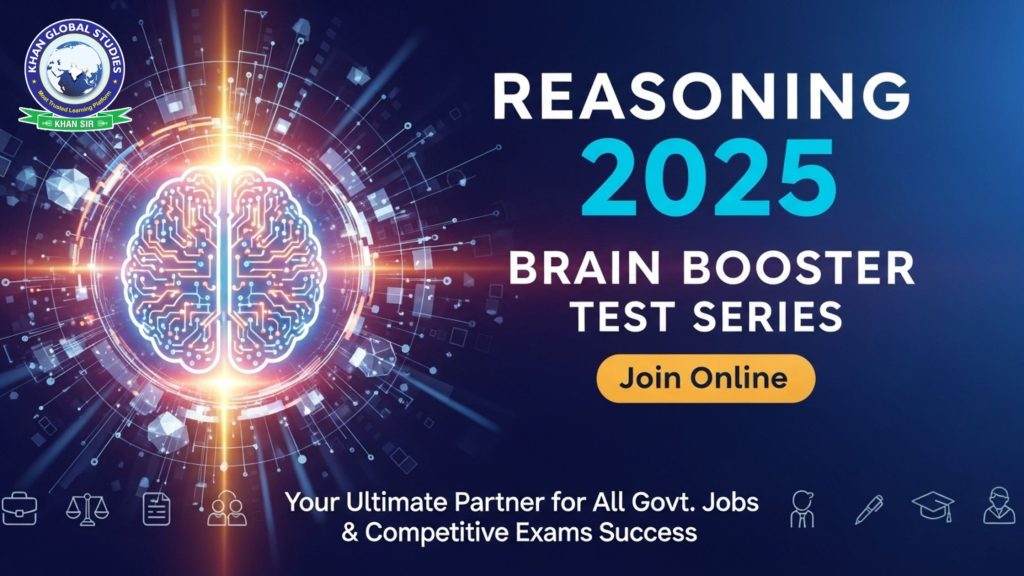Reasoning Brain Booster Test Series 2025 Online: The reasoning section has become the make-or-break component of most competitive examinations. From SSC CGL to banking exams, from UPSC to state PSCs, candidates who master reasoning skills consistently outperform those who don’t. Yet many aspirants struggle with this crucial section, often viewing it as an abstract hurdle rather than a learnable skill set.
Reasoning isn’t just about solving puzzles or cracking codes. It’s about developing logical thinking patterns that help you approach problems systematically. When you strengthen your reasoning abilities, you’re building mental frameworks that serve you well beyond exam halls.
The good news? Reasoning skills can be developed through structured practice and the right approach. This is where targeted preparation becomes essential for competitive exam success.
The Anatomy of Reasoning in Competitive Exams
Core Reasoning Components
Most competitive exams test reasoning through several key areas. Coding-decoding challenges your ability to identify patterns and apply logical rules consistently. Analogies require you to understand relationships between concepts and apply similar logic to new situations.
Classification problems test your skill in identifying what doesn’t belong in a group. Series completion (both numerical and alphabetical) evaluates your pattern recognition abilities. These aren’t random skills—they’re fundamental thinking processes that employers value.
Blood relations and direction and distance problems assess your spatial reasoning and ability to process multiple pieces of information simultaneously. Meanwhile, syllogisms and statement-conclusion questions test your logical deduction skills.
The Non-Verbal Dimension
Visual reasoning through non-verbal reasoning questions adds another layer of complexity. These problems test your ability to process information that isn’t presented in words or numbers. Pattern recognition in figures, understanding spatial relationships, and identifying missing elements in sequences all require different cognitive skills.
This diversity means that reasoning preparation can’t follow a one-size-fits-all approach. Different question types demand different strategies and practice methods.
Why Traditional Study Methods Fall Short
Many candidates approach reasoning preparation the same way they tackle other subjects—through memorisation and repetition. This approach fails because reasoning isn’t about remembering facts; it’s about developing problem-solving processes.
Speed without accuracy is another common pitfall. Candidates rush through practice questions without fully understanding the underlying logic. This creates false confidence that crumbles under exam pressure.
Inadequate practice variety also limits progress. Solving the same types of problems repeatedly might improve performance on familiar questions, but it doesn’t build the adaptability needed for unexpected variations.
The most successful candidates understand that reasoning requires systematic skill development rather than random practice. They focus on understanding question patterns, developing consistent approaches, and building speed gradually.
Building Your Reasoning Foundation
Pattern Recognition Skills
Strong reasoning begins with excellent pattern recognition. This skill underlies almost every reasoning question type. Whether you’re working with number series, alphabet sequences, or visual patterns, your ability to spot the underlying logic determines your success.
Start by practising basic pattern identification across different formats. Number patterns might involve arithmetic progressions, geometric sequences, or more complex mathematical relationships. Alphabet patterns could follow positional logic, skip patterns, or combination rules.
Logical Deduction Abilities
Syllogisms and statement-conclusion questions require solid logical deduction skills. These problems test your ability to draw valid conclusions from given premises without letting personal knowledge interfere with logical reasoning.
Practice identifying valid logical structures and common logical fallacies. Understanding concepts like universal statements, particular statements, and logical connectors helps you navigate complex reasoning chains confidently.
Spatial Reasoning Development
Direction and distance problems, along with non-verbal reasoning questions, require strong spatial intelligence. These skills help you manipulate mental images, understand spatial relationships, and track multiple moving elements simultaneously.
Regular practice with maps, directional problems, and visual pattern completion exercises strengthens these abilities. The key is consistent practice that gradually increases complexity.
Strategic Preparation Approaches
Sectional Focus Method
Rather than jumping randomly between question types, focus on mastering one reasoning area at a time. This sectional approach allows you to develop specialised skills and build confidence systematically.
Spend dedicated time understanding each question type’s specific requirements. Coding-decoding questions need different skills than blood relations problems. Mastering each area individually creates a stronger overall foundation.
Timed Practice Sessions
Reasoning questions often carry time pressure in competitive exams. Regular timed practice helps you develop the speed and accuracy balance necessary for exam success.
Start with untimed practice to build understanding, then gradually introduce time constraints. This progression helps you maintain accuracy while developing speed naturally.
Error Analysis and Improvement
Systematic error analysis accelerates improvement. After each practice session, identify mistake patterns and underlying causes. Common errors include misreading questions, applying incorrect logical rules, or making computational mistakes under pressure.
Keep a record of error types and review them regularly. This targeted approach prevents repeated mistakes and builds stronger problem-solving habits.
The Role of Structured Test Series
Exam Pattern Alignment
Quality test series provide practice that mirrors actual exam conditions. This alignment helps you understand question difficulty levels, time distributions, and the specific reasoning skills that examiners prioritise.
Regular exposure to exam-standard questions builds familiarity with question formats and reduces exam day surprises. This familiarity translates directly into improved performance.
Performance Tracking
Systematic performance analysis helps identify strengths and weaknesses across different reasoning areas. Detailed feedback shows which question types need more attention and tracks improvement over time.
This data-driven approach ensures your preparation time focuses on areas with the highest improvement potential rather than reinforcing existing strengths.
Competitive Benchmarking
Test series provide valuable competitive benchmarking through all-India rankings and percentile scores. Understanding where you stand relative to other candidates helps set realistic goals and maintain motivation.
This competitive element also simulates exam pressure, helping you develop the mental resilience needed for actual competitive examinations.
Maximising Your Reasoning Potential
Consistent Daily Practice
Daily practice builds reasoning skills more effectively than intensive cramming sessions. Regular exposure to different question types keeps your logical thinking sharp and helps identify patterns more quickly.
Even 30-45 minutes of focused daily practice yields better results than sporadic longer sessions. Consistency builds the mental agility that reasoning questions demand.
Smart Revision Strategies
Effective revision for reasoning differs from other subjects. Instead of reviewing facts, focus on practising solved examples and refreshing solution techniques. Quick practice sessions with previously attempted questions help maintain sharpness.
Create quick reference notes for different question types, including common patterns and solution approaches. These serve as valuable last-minute revision tools.
Maintaining Exam Readiness
Exam readiness requires more than just solving practice questions. Regular exposure to exam-standard test series helps maintain the speed and accuracy balance necessary for competitive success.
Stay updated with current exam patterns and question trends. Reasoning question formats evolve, and staying current ensures your preparation remains relevant.
Your Path to Reasoning Excellence
Mastering reasoning skills requires structured preparation, consistent practice, and strategic approach. The skills you develop extend far beyond exam halls, building logical thinking abilities that serve you throughout your career.
Success in competitive exams increasingly depends on reasoning performance. Candidates who invest in systematic reasoning preparation consistently outperform those who neglect this crucial area.
Ready to strengthen your reasoning abilities? Start with structured practice that targets your specific weak areas. Quality test series provide the systematic approach and performance feedback necessary for rapid improvement.




